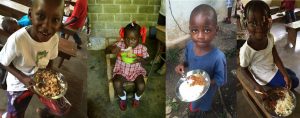Project Information
As you may have read or heard about in the media, conditions on the ground in Haiti have deteriorated in recent months. As a result, the parish needs to re-orient the way we offer support to our brothers and sisters in Haiti.
Here is a letter from Father John about these changes.
Stay tuned for more updates in the coming months.
Click here to read a September 2024 update directly from Haiti.
During Lent 2004, St. Andrew began an initiative to aid the children of Haiti. It began with prayers. As we learned more about the dire need in Haiti, our relationship grew. First we collected vitamins for the children. Next we sponsored a local Haitian’s training to become a health worker. Then, through the leadership of parishioner Dr. Charlotte Farin, who is also a professor of animal science at NC State, the Haiti Goat Project was born.
The core concept of the program is simple: to survive and succeed, children need food. St. Andrew is part of a larger project to build an infrastructure for raising fish, chickens and 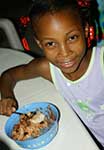 goats that provide a stable source of food, and most importantly vital protein, lacking in the children’s diet. Our parish has focused on beginning and expanding the goat population.
goats that provide a stable source of food, and most importantly vital protein, lacking in the children’s diet. Our parish has focused on beginning and expanding the goat population.
St. Andrew’s parish has raised tens of thousands of dollars over the years that funded the creation and advancement of the herd, provided critical supplies and built the goat barn, a facility that has been used not only for housing the goats but also for training other producers on ways to manage their own animals.
The Farm-to-Fork Chili Kabrit program began in 2012 when a group of St. Andrew’s parishioners traveled to Christianville to see if making goat-vegetable chili could be done and if Haitian children would actually like it. It was a success on both accounts and the Farm-to-Fork program was born. The Farm-to-Fork Program is a perfect example of how all of the programs in Christianville work together. Chili Kabrit starts with protein provided from goats purchased from local farmers or by the Haiti Goat Project. Vegetables come from local producers or from Christianville’s gardens. The students of the Christianville vocational agricultural program and the culinary institute work together to produce the chili. The end result is a highly nutritious and transportable food product that also supports the development of the local economy. Each month more than 5000 US dollars are pumped into the local agricultural economy to directly support local goat producers and vegetable growers in the Gressier community as they provide the components needed for making Chili Kabrit.
Click here to view a printable flyer about the Haiti Goat Project.
Ways to Contribute
At this time we are not collecting additional funds for Haiti Goat Project. Stay tuned for updates.
Please view the video below that was updated in 2021 about the Haiti Goat Project!
The Big Picture
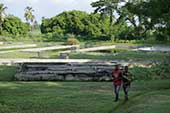
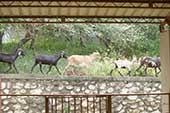
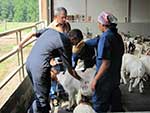
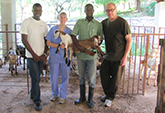
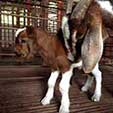
The project is headquartered at the Christianville Foundation, a 65-acre compound in the town of Gressier, Haiti. Our parish’s financial support has enabled the farm operation to build a successful goat program. By introducing genetics from U.S. herds, the program has built a sustainable herd – which means a reliable source of food for school children. The farm feeds lunch to 1800 children each day.
Our support was also instrumental after the 2010 earthquake in reconstruction of a Haitian school, providing the goat barn as a facility to house school children and then rebuilding the goat program after it was used to meet immediate needs during the crisis
Contacts
Jodi Martinez, haitigoat@saintandrew.org


